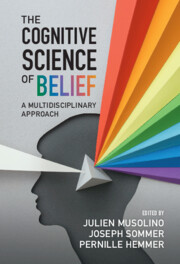Book contents
- The Cognitive Science of Belief
- The Cognitive Science of Belief
- Copyright page
- Contents
- Figures and Tables
- Contributors
- Chapter 1 Introduction
- Part I Understanding Belief
- Part II Domains of Beliefs
- Religion and Morality
- Economics and Politics
- Chapter 13 Political Belief Formation: Individual Differences and Situational Factors
- Chapter 14 Americans’ Lack of Political Beliefs and the Consequences for Democracy
- Chapter 15 Thoughts and Players: An Introduction to Old and New Economic Perspectives on Beliefs
- Science and Race
- Part III Variation in Beliefs
- Index
- References
Chapter 13 - Political Belief Formation: Individual Differences and Situational Factors
from Economics and Politics
Published online by Cambridge University Press: 03 November 2022
- The Cognitive Science of Belief
- The Cognitive Science of Belief
- Copyright page
- Contents
- Figures and Tables
- Contributors
- Chapter 1 Introduction
- Part I Understanding Belief
- Part II Domains of Beliefs
- Religion and Morality
- Economics and Politics
- Chapter 13 Political Belief Formation: Individual Differences and Situational Factors
- Chapter 14 Americans’ Lack of Political Beliefs and the Consequences for Democracy
- Chapter 15 Thoughts and Players: An Introduction to Old and New Economic Perspectives on Beliefs
- Science and Race
- Part III Variation in Beliefs
- Index
- References
Summary
This chapter reviews research at the intersection of psychology and political science that studies how people form political beliefs. We discuss the degree to which people’s motivations shape the beliefs that they form, paying particular attention to the extent to which people’s political beliefs are generated through reflection. Both individual differences and situational factors affect the extent to which people are reflective in political domains. As always, more questions remain than researchers have answered, and we conclude with some thoughts about the most pressing ones that future research should tackle.
Keywords
- Type
- Chapter
- Information
- The Cognitive Science of BeliefA Multidisciplinary Approach, pp. 279 - 297Publisher: Cambridge University PressPrint publication year: 2022
References
- 1
- Cited by

